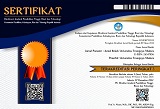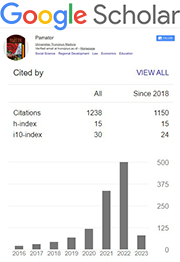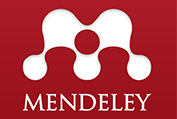The Role of Forum for Religious Harmony in Improving the Quality of Life Attitudes Tolerance among Religious Groups in the City of Kupang
Abstract
This research was conducted with the aim of: describing the FKUB work program as an effort to improve the quality of tolerance. Describe the obstacles in implementing the FKUB Work program. Describe efforts to overcome barriers and Describe the quality of tolerance among religious people in Kupang City. The method used in this research is qualitative methods are descriptive, data collection techniques in the form of interviews and document studies. The results of this study indicate that: 1) The role of the NTT FKUB in building religious tolerance in Kupang City was carried out with routine programs in the form of dialogue, seminars, socialization, speech competitions and hyme competitions and harmony marriages, non-routine programs in the form of book publishing, striker making , religious calendars and banners. 2) There are obstacles in the form of busy religious leaders, so the meeting has not run well, communication at meetings only occurs when there are meetings and limited facilities. The government and the community are not aware of the role of NTT FKUB. 3) conducted with discussions between the governing body, communication with the government, socialization, making proposals and saving funds in accordance with needs.4) Harmony in Kupang City runs well without any religious conflict due to the existing harmony in the city of Kupang is a legacy of the ancestors who continue to be guarded and developed to date.
Keywords
Full Text:
PDF (Bahasa Indonesia)References
Abdul Kirom (2015). Forum on the Role of Religious Harmony (FKUB) in Caring for the Life of Religious People: Study of the Bantul Fkub Yogyakarta. Master's Thesis, UIN Sunan Kalijaga Yogyakarta. (Thesis available on page (www.googlecendekia.com)
Afif Muhammad (2013). Religion and Social Conflict. Bandung: Marja
Ali M (2003). Multicultural Pluralist Theology: Appreciating DiversityTwitting Togetherness. Jakarta: Kompas Publisher
Budyatna, M and Ganiem, L.M (2011). Interpersonal Communication Theory. Jakarta: Kencana.
The Ministry of Religion of the Republic of Indonesia (2007) Theological Frame of Religious Harmony in Indonesia, Jakarta; Religious Harmony in Indonesia
Muhammad Yusri FM. (2008). Principles of Multiculturalism Education in the Teachings of Religions in Indonesia. Journal of Islamic Education Department of Islamic Education Tarbiyah Faculty of UIN Sunan Kalijaga Yogyakarta. Vol.3, No.2.
Munawar Said, Agil (2005). Jurisprudence of Interfaith Relations. Jakarta; Ciputat Press
Nasir, F. N (2012). Educational Strategies for Understanding Revelation and Science in Yogyakarta: Student Library
Sugiyono (2012). Qualitative Quantitative Research Methods and R&D. Bandung: Alfabeta
Yewangoe.A.A (2002). Religion and Harmony. Gunung Mulia: Jakarta
DOI: https://doi.org/10.21107/pamator.v13i1.6913
Refbacks
- There are currently no refbacks.
Copyright (c) 2020 nimrod frebdes taopan

This work is licensed under a Creative Commons Attribution-ShareAlike 4.0 International License.
Jurnal Pamator : Jurnal Ilmiah Universitas Trunojoyo by Universitas Trunojoyo Madura is licensed under a Creative Commons Attribution-ShareAlike 4.0 International License.















.png)